Euro Coins
The Central Bank acts as an agent of the Minister of Finance in the production and issue of euro coins. All seniorage received is returned to the Irish Exchequer.
There are currently 19 member states of the Eurozone. All euro coins have a distinct common side (obverse) and national side (reverse), the latter of which is specific to each member state. The euro coin series comprises eight different denominations: €2, €1, 50c, 20c, 10c, 5c, 2c and 1c.
Common side
The common side of the coins was designed by Luc Luycx of the Royal Belgium Mint. His initials are visible on the obverse of the coins. The obverse displays a geographical image of Europe, except for the 1c, 2c and 5c coins which show Europe in relation to Africa and Asia.
The design of the obverse has remained the same since 2002, apart from an update in 2007 to include 10 new accession countries, although not all were members of the Eurozone.
|
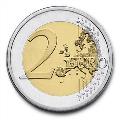
Denomination:
€2
Diameter (mm): 25.75
Thickness (mm): 2.20
Weight (g): 8.50:
Composition: Cu Zn Ni
|
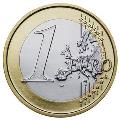
Denomination:
€1:
Diameter (mm): 23.25
Thickness (mm): 2.33
Weight (g): 7.50 :
Composition: Cu Zn Ni
|
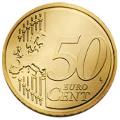
Denomination: 50c
Diameter (mm): 24.25
Thickness (mm): 2.38
Weight (g): 7.80
Composition: Nordic Gold |
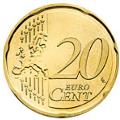
Denomination:
20c:
Diameter (mm): 22.25
Thickness (mm): 2.14
Weight (g): 5.74 :
Composition: Nordic Gold
|
|
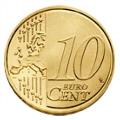
Denomination:
10c :
Diameter (mm): 19.75
Thickness (mm): 1.93
Weight (g): 4.10 :
Composition: Nordic Gold
|
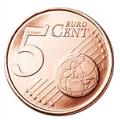
Denomination:
5c :
Diameter (mm): 21.25
Thickness (mm): 1.67
Weight (g): 3.92:
Composition: Copper-covered steel
|
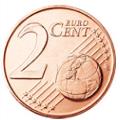
Denomination:
2c :
Diameter (mm): 18.75
Thickness (mm): 1.67
Weight (g): 3.06
Composition: Copper-covered steel
|
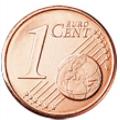
Denomination:
1c :
Diameter (mm): 16.25
Thickness (mm): 1.67
Weight (g): 2.30 :
Composition: Copper-covered steel
|
National side
Ireland decided to retain the national design which appeared on IR£ coins for our national side. Irish euro coins feature the Celtic harp, a traditional symbol of Ireland, decorated with the year of issue and the inscription "Éire" − the Irish word for Ireland. This particular harp was designed by Jarlath Hayes.
The edge-lettering on the Irish €2 coin is the same as the French design. It is also adopted by Belgium, Luxembourg and Spain amongst others.
|
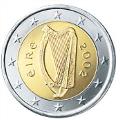
€2
|
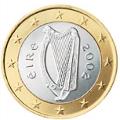
€1
|
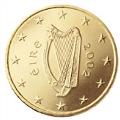
50c
|
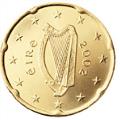
20c
|
|
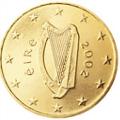
10c
|
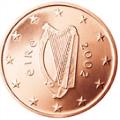
5c
|
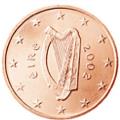
2c
|
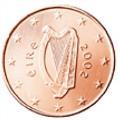
1c
|
Commemorative €2 coins
Each country in the Eurozone can issue two commemorative coins per year. These coins generally commemorate historical events, people of significant national importance or celebrate national treasures. They have the same features, properties and legal status as the standard €2 coins.
The responsibility for designing and issuing commemorative €2 coins lies with the member states. The ECB approves the volume of coins that each country may issue.
Ireland has issued 4 commemorative €2 coins in conjunction with other Eurosystem countries to commemorate significant moments in the European Union: 50th anniversary of the Treaty of Rome (2007), 10 years of the EMU (2009), 10 years of Euro banknotes and coin (2012) and 30 years of the EU flag (2015).
|
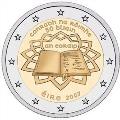
2007: 50th Anniversary of the Treaty of Rome
|
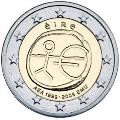
2009: 10 Years of the European Monetary Union
|
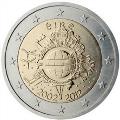
2012: 10 years of euro coin and banknotes
|
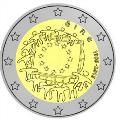
2015: 30 Years of the EU flag
|
Additionally, in 2016, Ireland issued its first national commemorative €2 coin. This coin, designed by Emmet Mullins, featured a depiction of the statue of Hibernia on top of the GPO and was issued to mark the Proclamation of the Irish Republic in 1916.
|
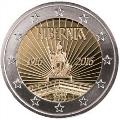
2016: 100th Anniversary of the Proclamation of the Irish Republic
|